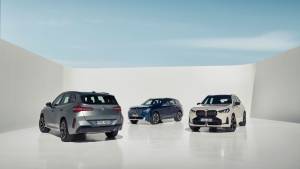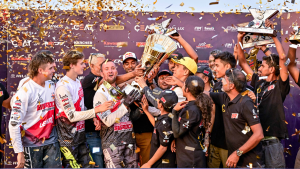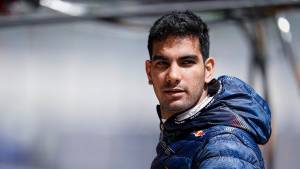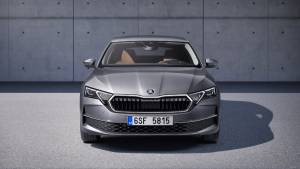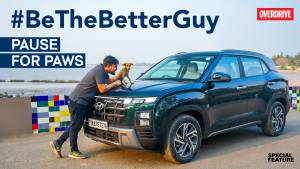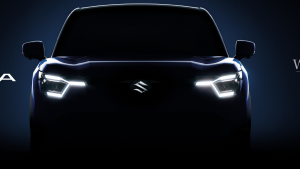Interview: Kevin Schwantz on his 25 GP wins, 21 lap records and more
Kevin Schwantz had just one championship title to his credit by the end of his eight-year long GP career. But he made quite a lasting impression with 25 GP wins, 21 lap records and 29 pole positions during his time with Suzuki. It's not hard to see why though, especially when one watches videos of Schwantz from his peak racing days. We were lucky enough to catch up with the legend on his recent visit to India during the 2015 MMSC Race Fest â" and what an interesting chat that turned out to be.
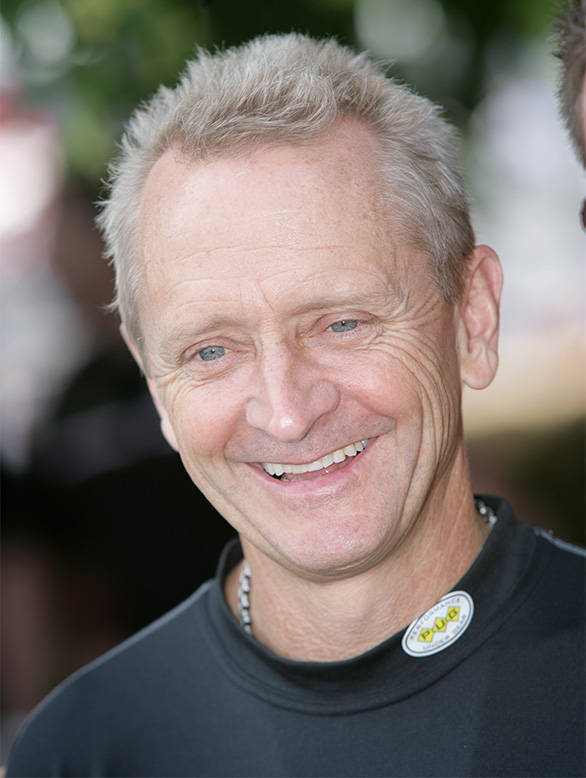
OD: Is this your first time in India?
Kevin: Yes
OD: And how are you finding the experience so far?
Kevin: You know, it's been fun. Any time you come to a track of this caliber to watching racing, it can't get any better than that.
OD: What did you think about the talent pool that's here in India from the racing that you have seen?
Kevin: You know I wish I could have spent more time with them⦠Really for me, [the only way] to give an honest opinion on what I think about the riders and their ability, is for me to ride with them. I haven't had that opportunity on this trip but maybe next year before the Gixxer Cup gets started we could do something where I come over and do some testing with some of the kids but I don't know [at this point] how that will work out yet. It would be so much easier for me to assess where the level is at. Looking at the Novice times and the Open times, there isn't a huge gap, which is good to see. The same thing that makes you fast on a MotoGP bike should make you fast on a Suzuki [Race] Gixxer, that's for sure. To be fast, you've got to be smooth, you've got to be consistent, you can't make mistakes and you've got to have rhythm, all these things apply to that motorcycle, just like they do to a top level MotoGP bike.
OD: Looking back at your career, you started out with motocross and enduro racing - at that time did you think that was something for you?
Kevin: I did it because it was something easy for me to do. My dad rode trials bikes and so we were always going to the woods and riding and you know, getting on an enduro bike or a motorcross bike is really easy. Not to be a national championship winning level rider but to play around at the local track with the expert guys, I could do it. I couldn't do it every weekend because I wasn't training that much and it really didn't have the ability to because my parents had to work for a living, even though they did support me, they could only do it on a weekend. I still enjoyed the odd woods ride and going to the local motocross track and riding for a couple of hours. So whether it's a trials bike or a MotoGP bike or anything between those two, the same basic theory applies to what makes you able to do things on it. I just love anything with two wheels that's got a motor.
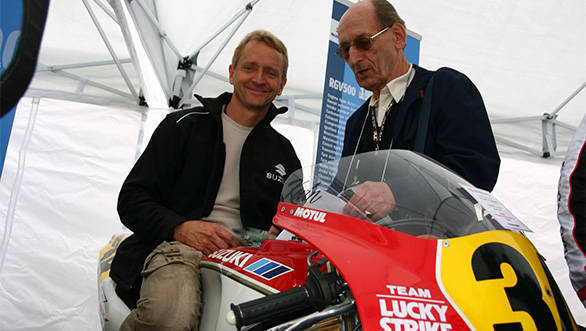
OD: Your switch from racing off-road to road motorcycles happened after a crash in 1983. Can you take us through the incident?
Kevin: I went racing in Huston, Supercross, and I crashed and I was like 'I'm never going to be able to train to compete with those guys.' I was following Mike Bell that day and he went over this bump, this jump of about this high [Kevin indicates a gap of about one and a half foot high with his hands] and he just soaked it up and I went over it and went over it and [makes a tumbling motion] you know?
OD: How did that affect you mentally? Did the crash affect your state of mind?
Kevin: Not really. It was in front of my parents and in front of the crowd that was in the astrodome but I was happy with where I was in the first couple of laps of the race. I think I knew in my mind that I'd never be able to compete with those guys, because I wasn't going to be able to ride and train five or six days of the week like those guys did. It didn't change my love for motorcycling, that's for sure.
OD: Could you tell us a little bit about your interaction with Suzuki. It started off with superbikes and did you think it would be a partnership that lasted this long?
Kevin: I had no idea. When I went to willow springs for that try out with Yoshimura Suzuki, I had no idea what was going to happen. I could have gone there and failed miserably. I didn't get any practice. The team showed up and I think I got two laps of practice on a brand new bike that I had never ridden with slick tyres. I had no idea what to expect. On the start of the first race I stalled and I had to get off and push it and I couldn't get it started until somebody came and helped. I finally got it going and still won that eight-lap race from at least eight or ten seconds behind. So it was a great day and the first race and the last race I remember and everything in between has been such great memories for me. Did I know where the Suzuki meeting would go? When I went for the Yoshimura ride I had no idea that Suzuki was coming up with a new bike in 1986 and maybe I'd be the one who got to ride it and develop it for a couple of years in America and then go grand prix racing. You never know what's going to happen. I did ok in 1986 and got a whole lot better in 87 once we had developed the Gixer (GSX-R750) a little bit. Then 1987 was the year I got to go ride three grand prix on the new V4 Suzuki and I put it in the top ten every time I rode it, even though I had little experience with just three races in 86.
OD: I though 1987 was your first GP experience.
Kevin: When I went to the match races in 1986, Barry Sheen kept me over for an extra week or so. I tested one of his old bikes and he was like, "Man, you're riding well and I'm gonna get you a proper bike and we'll do the race of the year." So without Barry's help, getting on a 500 wouldn't have happened as quick. After I did the race of the year and we almost won, Barry took me to Suzuki and said, "Let's build him a bike and take him to Assen (Netherlands), Belgium and Missano (Italy). It fits his American schedule and doesn't interrupt or interfere with any of that." So he was a big part of me getting the opportunities that I got early on.
OD: How was that experience of being in GP500s and the top level of racing at that time?
Kevin: Every time I went and did a grand prix, and especially in 1987, and Wayne Rainey will tell you today that, every time I came back [to American superbikes], I was that much faster on my superbike. The level of competition and the depth of the pool when you're racing in a grand prix is that much better. There's 25 guys that can win the race, there's 25 guys that are really fast and in American superbike racing, there's three or four factory bikes and that was it. I think every time I went, whether I felt like that at the time I learned anything I don't know, but it seems like my competitors think I did.
OD: When did you get a sense that you had arrived on the scene so to speak, and that you would be competing for the world title with the likes of Gardner and �
Kevin: You know those first six grand prix I did in 1986 and 87, I wasn't sure. My best finish in those two seasons was fifth at Jerez and I had Randy Mamola, Christian Sarone and Pierre Francesco Chili behind me, right behind me, pushing me the whole race and, I thought, "Well, this is a great start. The bike's not bad." It definitely wasn't as fast as the well-developed Yamahas and Hondas at the time. But Suzuki did a great job in 1987 - they got back into racing in 1988 and we worked really hard and in 1989, we probably had, no there's no doubt, we had the best bike out there but we had the most inexperienced rider (laughs) on it. And had we not had the mechanical problems we had with the bike in 1989 or I hadn't crashed it three times, we still could have competed for that championship. It would have been going to Japan in 1988 and winning that Grand Prix and I thought, "Huh, I can win a grand prix!" It was in the dry, in Honda's backyard, with the Honda guys pushing me the whole time. Then I got to realise why Suzuki always had me go ride the Eight Hour, because for them, the grand prix is really important as is the Eight Hour. We had gone and tested a month before and we got two hours on the track and I was just furious about having to go to Japan to test for two hours. And the two hours that we got in the dry are what won us that race, because we got a set up. Because all week long, practice and qualifying, everything, even morning warm up, even though the sun was out, was wet. No one had a chance to get any set ups right but we were spot on.
OD: Through your career your closest rival was Rainey. When did you realise that he would be an arch nemesis, so to speak.
Kevin: I think the first time we ever met the fact that we didn't like each other and the fact that we couldn't stand to be in the same room with each other was mutual. At the time in 1986, he was racing a 250 and 500 in America. In 1984, he had gone to Europe and rode a 250 and failed miserably. So he was back in America and racing for Bob McLane and Bob's a good friend of mine and I was pretty close to Bob. Wayne hurt himself a little bit in 1986 and then the next thing you know, he's racing a superbike against me in 1987. As soon as we got into the same class, the treatment that we gave each other on the track, you know, trying to just do everything we could to show him up â" beat him every chance I got. It wasn't until we both got into grand prix racing and both had a couple of wins under our belts that we would walk past each other in the paddock at a grand prix and acknowledge each other, it took a while. And I think just like he thought, I thought the same that the world's not big enough for the both of us. There's only one of us Americans who's going to be able to succeed on a grand prix bike and I think that should be me and not you. Yet little did we know the real world was plenty big for the both of us.
OD: I grew up watching you race in grand prix and you two had some amazing battles. One of my favourite was the Race in Assen in 1991 when he went off on the last lap and handed you the win.
Kevin: A little more knowledge of that race - two weeks before in Hokenhiem is when I passed him up the inside and I'm sure that's all that he could think about was how miserable he'd been for two weeks because I showed him up going into the stadium [section of the track] beating him at the German Grand Prix. Because if he had even once looked over his shoulder, the whole last lap he was doing [shows a gap increasing with his hands] that to me. I mean he had at least twenty bike lengths on me, going into the chicane, he didn't have to try, didn't have to do what he did. But he was convinced I was right there. And people say why do I look over my shoulder so much and well, it's so I hope I won't make a mistake like that in the last corner. Because if you ask him today, that's the worst defeat that he ever had in my hands because he gave it to me. He said, "If you beat me you beat me, but when I beat myself I hate it even more."
OD: One of the laps in that raceâ¦
Kevin: The last lap. I had the lap record from that last lap. He had that much of a faster lap to the last corner and then [he] screwed it up. That lap record held till they changed the track.
OD: Yes, for ten years. I was going to ask you about that. What did you do on that last lap?
Kevin: I came within an inch of just giving up and saying, "He's got me f**king beat today. I can't do anything but I kept my head down just enough. My lap was a 2:01, I can only imagine his lap would have been a high 1:59 or 2:00. It would have been so fast.
OD: I think it stood through the Doohan era, the development of the Honda Screamer and Big Bang engines that dominated racing and..
Kevin: Four strokes also..
OD: Yes, one year of four strokes and two years of Valentino Rossi.
Kevin: And they would all out qualify the lap record but they could never race that fast. On Dunlop tyres by the way. That was the one year we ever raced on Dunlop tyres.
Also see:
